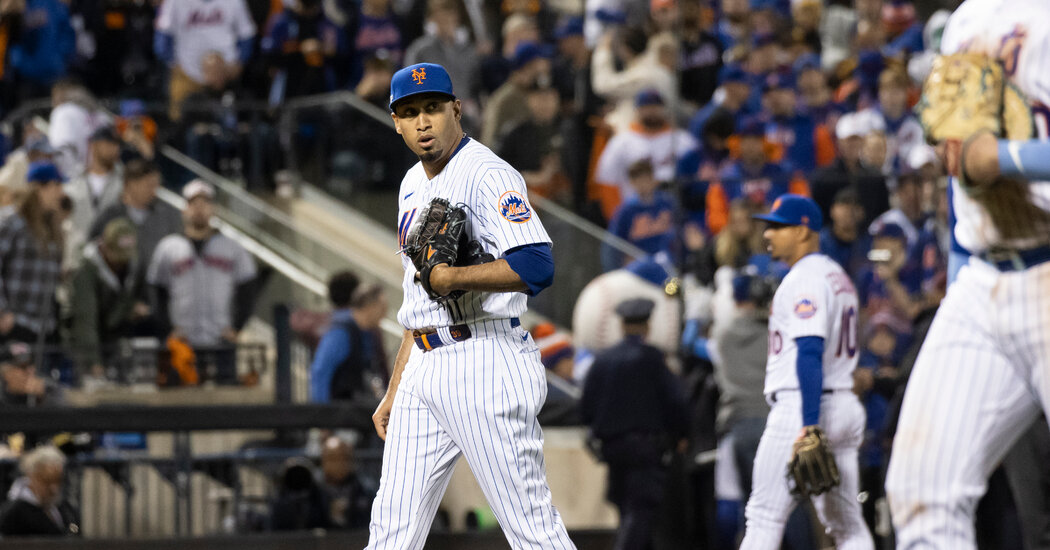
There are very few things more polarizing in baseball than the value of relief pitchers. Some will swear that relievers are interchangeable parts and are far too volatile on an annual basis to take them seriously. Others will insist that a team can’t possibly win without an officially sanctioned Capital-C Closer (bonus points if he wears glasses or has interesting facial hair).
The Mets, under the team owner Steven A. Cohen and General Manager Billy Eppler, appear to be part of the latter group, as they are in the process of finalizing a $102 million contract with the Capital-C Closer Edwin Díaz, according to a person familiar with the negotiations who is not authorized to discuss them publicly. It would be a record-breaking deal that would keep Timmy Trumpet’s and Blasterjaxx’s version of “Narco” blasting over the loudspeakers at Citi Field for the next five seasons.
For context, the previous record deal for a reliever was the five-year, $86 million contract the left-handed closer Aroldis Chapman signed with the Yankees before the 2017 season. Among active contracts, only two relievers, the right-handers Raisel Iglesias of Atlanta and Liam Hendriks of the Chicago White Sox, are guaranteed even half as much as Díaz is set to earn.
It is easy to see why a team would be keen to keep Díaz, a hard-throwing right-hander. He just completed a season in which he had a 1.31 E.R.A. in 61 appearances and struck out 50.2 percent of the batters he faced. He has proved to be wildly popular with Mets fans, for both his dramatic entrances and his extreme reliability, and over the last five seasons he has been the second-best reliever in Major League Baseball, in terms of wins above replacement, even with his disastrous 2019 season included.
So why would anyone question such an accomplished player being handed a record contract? The reality is that relievers, thanks to their small number of innings pitched, are often seen as having less of an impact on a team’s ability to win over long periods of time than starters and position players. Díaz’s 8.2 WAR over five seasons, using Baseball Reference’s metric, may make him the second-most valuable reliever in M.L.B. in that span, but they have him tied with the journeyman starter Mike Fiers and two others for 55th among all pitchers.
But with the Mets of the Cohen era, this deal very likely has far more to do with a few late-October games than it does with sustained regular-season success (or the ability to profit off toy trumpets). Cohen wants to win a World Series, the franchise’s first since 1986, and he seems to believe that having Díaz at the back end of his bullpen is a way to make that goal more attainable.
Watching this year’s World Series would only have encouraged that belief.
As Games 4 through 6 reached their later innings, the Philadelphia Phillies knew exactly what was coming from the Houston Astros. Some combination of the right-handed relievers Bryan Abreu, Héctor Neris and Rafael Montero was going to take over for Houston’s starter, rendering Philadelphia’s bats largely helpless, and the Capital-C Closer Ryan Pressly was going to slam the door.
Pressly did not allow an earned run all postseason, and in the World Series he was on the mound to finish all four of Houston’s wins.
Thanks largely to his thrilling five-out save in Game 5, Pressly recorded one of the 10 most impactful World Series performances by a reliever in terms of championship win probability added, according to research conducted by Baseball Reference. The statistic, which attempts to estimate how much effect a player’s performance had on his team’s ability to win a championship, credits Pressly with a shocking total of 33.87 cWPA in this year’s World Series (meaning he was single-handedly credited with just over one-third of a win).
It is a higher mark than Mariano Rivera reached in any of the seven World Series he played in, and the list of nine relievers who have been more important than Pressly in a single Series features multiple Hall of Famers:
Those who would diminish the value of relievers might point out that the most impactful performance by a reliever in World Series history came from a starter, when Madison Bumgarner tossed five scoreless innings of two-hit ball as a reliever in Game 7 of the 2014 World Series to shut down the Kansas City Royals. Indeed, five of the 10 best relief performances were put in by starters masquerading as relievers.
But Pressly, pitching five and two-thirds innings, managed more than double the cWPA of shortstop Jeremy Peña (16.5), who won the World Series Most Valuable Player Award. Relievers, it seems, have a hard time building value over the course of a season, but in any single postseason game they can decide everything.
Under Cohen, the Mets do not operate under the budget limitations of a typical baseball team, so the amount given to Díaz probably does not matter all that much provided he eventually does something close to what Pressly just did. And with multiple other openings in the Mets’ bullpen following the disappointing end to their 2022 season, Cohen might not be done spending.
So in that context, the answer to how much a top-flight reliever is worth in the current market can most likely be summed up as: However much Steven A. Cohen is willing to pay.
James Wagner contributed reporting.